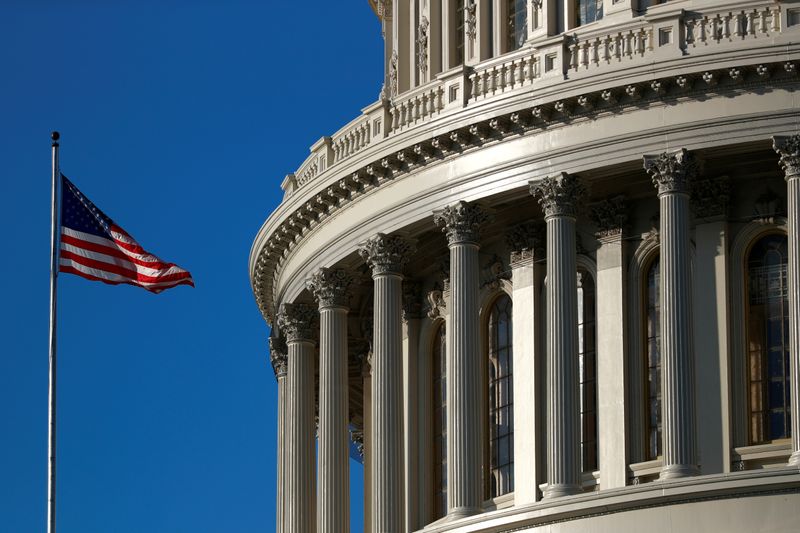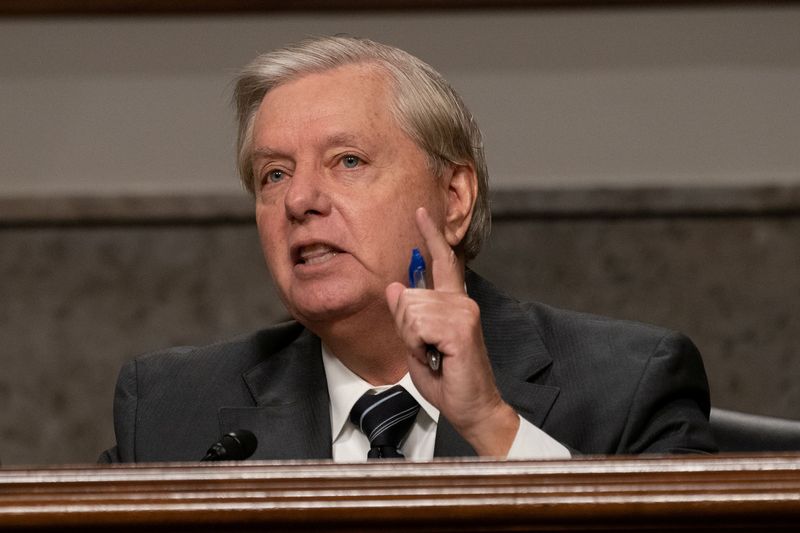(Reuters) - This year's election year battle for control of the U.S. Senate is intensifying, as Republicans prepare to push through President Donald Trump's Supreme Court nominee in the closing weeks of a campaign dominated by the coronavirus pandemic.
Republicans hold a majority of 53 seats in the 100-seat Senate. But the number of competitive Republican seats has grown to include the one held by Senate Judiciary Committee Chairman Lindsey Graham (NYSE:GHM), who is running neck and neck with Democrat Jaime Harrison in the traditionally Republican state.
Democrats would need to net at least three Republican-held seats for a majority, if Democrat Joe Biden wins the White House, giving his running mate Kamala Harris a tie-breaking Senate vote, or four seats if Biden loses.
Here is a look at eight races where Senate Republican incumbents are locked in highly competitive contests against Democratic challengers, and two where Democrats are on the ropes:
Vulnerable Republicans:
ARIZONA
Republican Senator Martha McSally lags Democratic challenger Mark Kelly in fundraising and trails him by an average of nearly 7 percentage points in opinion polls, according to the campaign tracking website RealClearPolitics.com.
McSally, a former U.S. representative and U.S. Air Force combat pilot, was appointed to the seat once held by the late Republican Senator John McCain after losing her 2018 Senate bid to Democrat Kyrsten Sinema. Kelly, a former astronaut and U.S. Navy combat pilot, has been leading McSally in opinion polls for more than a year.
COLORADO
Republican Senator Cory Gardner, a former U.S. representative who entered the Senate in 2015, is among the most vulnerable Senate Republicans partly because of his allegiance to Trump, in a state that has gone Democratic in the last three presidential elections.
Democrat John Hickenlooper, a former two-term governor and 2020 presidential hopeful, is leading Gardner in opinion polls. But Gardner holds a sizeable cash advantage and the Democrat's polling lead has largely kept below the double-digit advantage he held in July, according to FiveThirtyEight.com.
GEORGIA
First-term Republican Senator David Perdue, a wealthy businessman who promotes himself as a Trump ally, holds only a slight lead over Democratic challenger Jon Ossoff, according to RealClearPolitics.com.
Ossoff, an investigative journalist and media executive, ran a powerful campaign for a U.S. House of Representatives special election in 2017 but ultimately lost. Democrats believe he could oust Perdue, partly as a result of public disaffection for Trump's response to the COVID-19 pandemic that has hit Georgia hard.
IOWA
Democrat Theresa Greenfield, an urban planner and real estate developer, appears to hold a small lead over Republican Senator Joni Ernst at a time when Iowa is still experiencing a high number of coronavirus infections.
Greenfield has accused Ernst of being a rubber stamp for Trump and not taking the COVID-19 pandemic seriously enough at a time when coronavirus infections are rising in the state. Ernst, a first-term U.S. senator with a cash advantage over her opponent, labels Greenfield as hostile to police and says her campaign is bankrolled by out-of-state liberals.
MAINE
Four-term Republican Senator Susan Collins, a New England moderate long known for her independence, has seen her popularity flag among voters amid criticism that she has failed to be a moderating force in the Senate during Trump's presidency.
Her Democratic challenger, Maine House of Representatives Speaker Sara Gideon, has led Collins by several percentage points in opinion polls and has out-fundraised the Republican.
MONTANA
Republican Senator Steve Daines faces a tight re-election bid against two-term Governor Steve Bullock, a former presidential candidate who has branded himself as an independent-minded Democrat. Daines, a former congressman and software executive, is known as a reliable conservative and has touted his ties to Trump.
Bullock was a late entry, jumping into the race in March. But he managed to raise funds quickly. The Democrat led Daines in opinion polls into the summer. But the Republican currently leads Bullock by an average of less than 2 percentage points, according to RealClearPolitics.com.
NORTH CAROLINA
Republican Senator Thom Tillis trails his Democratic challenger, former state Senator Cal Cunningham, who has also steadily outraised him in campaign donations.
But the North Carolina race has been thrown into confusion by two unexpected events: a sexting scandal in which Cunningham has acknowledged sending romantic texts to a woman who is not his wife; and a positive COVID-19 test result for Tillis, who attended a crowded White House function where many guests did not wear masks or follow social distancing guidelines.
SOUTH CAROLINA
Graham, one of Trump's closest allies in Congress, was last reelected to the Senate in 2014 with more than 55% of the vote. But this year, he is in a dead heat against Harrison, who is running a powerful campaign backed by impressive fundraising.
Once viewed as a Trump critic, Graham's future may depend on whether voters reward him for overseeing next week's Supreme Court confirmation hearings for Trump nominee Amy Coney Barrett. Analysts say some conservatives do not trust his conversion to Trump ally, while the loss of his former maverick persona has disappointed moderates.
Vulnerable Democrats:
ALABAMA
Senator Doug Jones, considered the most vulnerable Democrat in the Senate, won election to the seat that Republican Jeff Sessions vacated to become Trump's attorney general in 2017. In a state normally considered safe for Republican candidates, Jones bested former Alabama Supreme Court Chief Justice Roy Moore, whose campaign was snarled by allegations of sexual misconduct.
The Democrat now faces former Auburn University football coach Tommy Tuberville, a Republican who defeated Sessions' attempted comeback earlier this year. Recent polls show Tuberville leading Jones by double digits.
MICHIGAN
Democratic Senator Gary Peters holds a small lead over Republican challenger John James in a state that represents a major battleground in Trump's re-election bid.

The race leans in Peters' direction, according to analysts. But James, a Michigan businessman, has been outraising the Democrat in campaign donations, though Peters reported a larger amount of cash on hand over the summer.
